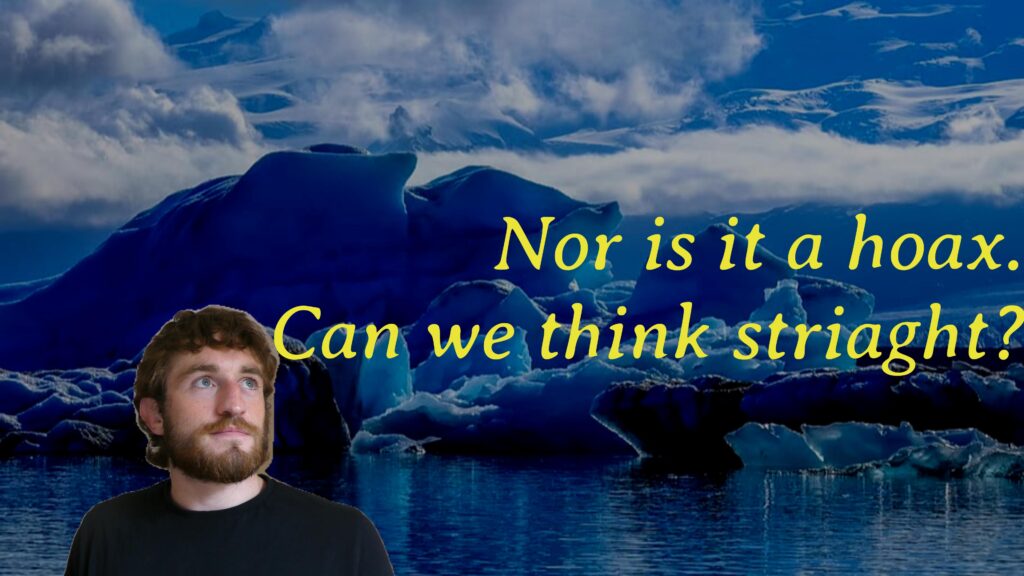Nor is it a hoax.
Can we think straight?
The internet is full to the hilt with stories, posts, and articles that all speak to the horrible ecological situation we humans collectively find ourselves in. “Environmentalism” has found its way into the mainstream, and is invoked in almost every area of our lives, from the way we eat our food, to the way we run our businesses.
The incessant bombardment of bad news through social media (SM) platforms is a relatively new phenomenon. Although it’s a play on an older theme. The legacy mass media (LMM) platforms had perfected fear mongering and other propagandistic techniques to maintain audience engagement well before the rise of SM platforms.
Sprinkled throughout the massive volume of doom-and-gloom posts however, there are some highly relevant stories. “Relevancy” being defined by the likelihood some event or phenomenon is going to affect an individual’s life.
There is a wide delta between the stories reported on through LMM platforms, and the relevant stories that crop up online through SM platforms. David Fuller (a journalist and filmmaker) refers to this delta as “the uncanny valley.”
This delta can be maddening for those of us who are clued into SM channels that reliably report on relevant stories. The failure of those stories to move from SM space to LMM space means they won’t get the attention they deserve.
An example of this is the problem of PFAS in the biosphere.
The PFAS Problem
Per- and poly-fluoroalkylated substances are colloquially known as “forever chemicals.” These chemicals are used for a number of industrial reasons, such as coating material as a water repellent. These chemical compounds are impossible to break down in nature, as the carbon-fluorine bond is too strong. They can be found in concentrations well above EPA-approved limits in rainwater across the globe. And eventually find their way into human bodies, where they wreak havoc on our endocrine systems.
This is a problem that, were our institutions operating properly, would be much more well understood.
One of the Problems with the Internet
Before the behemoth social media companies adopted their infinite scroll model, newsfeeds were populated by content created by close friends, and in reverse chronological order. From newest to oldest piece of content. You could reach the bottom of your newsfeed!
Now, the content of our newsfeeds is determined by algorithms that have been trained to optimise for user’s attention. These algorithms “know” the best type of content to populate your newsfeed with to keep your attention for as long as possible. This type of content tends to be either limbic-system hijack emotionally inflammatory stuff, or meaningless, valueless pure entertainment stuff. And with infinite scroll, it’s never ending!
Although I understand there is an algorithm optimising for my engagement, and will do so by showing inflammatory content, I don’t necessarily understand how that affects my worldview after I put my phone down. When I put my phone away, the negative effects of the limbic-hijack stuff surely carry over into my perception of the real world? For example, with a disproportionate presentation of inflammatory content on my newsfeed, I might erroneously come to the conclusion that the real world is as doom-and-gloom as my newsfeed would suggest.
Internet as Both Blessing and Curse
No doubt, the internet has innumerable negative effects on the human psyche.
But! We can choose to intelligently, and strategically use it as a tool to help clarify our human predicament.
We’re fighting an uphill battle here though, because social media platforms subscribe to an engagement-based business model, which tugs on our most basic of desires, making it hard to use the internet as an effective tool.
On top of this, we live in chaotic times where the Overton window of permitted discussable topics in polite society is being blown wide open by the internet. Whereas before, the LMM platforms determined the bounds of the Overton window, SM platforms are facilitating its rapid widening. Because this widening negatively affects those in society with vested interests, we get the proliferation of derogatory epithets used to dismiss a person who broaches topics considered “beyond the pale” (from the LMM perspective) so as to ensure the Overton window remains where it is.
We’re living in a transitionary period between worlds. On the one hand, we have the world of the past, where LMM platforms kept citizens of the earth up to date on notable events and phenomena. On the other, we have a new world being birthed, where the influence of LMM platforms is significantly reduced and replaced by SM platforms. The rate and magnitude of change we become informed about through SM posts and articles gives the impression that consequential global events are rapidly outstripping our species’ ability to keep up.
Hard Times Create Strong People
Although our chaotic times are indisputably unprecedented (in terms of the god-like technology we wield, and its downstream consequences.) We humans are no strangers to adversity.
Generations before us had the wherewithal to couple scientific research, and the deep insights that follow, with technological innovation. They have brought us to this place of having God-like technologies at our disposal. But they forgot to simultaneously cultivate the wisdom that should have accompanied those developments.
It is now our duty to raise wisdom up to the level defined by the powerful technologies we have at our fingertips. Only then will we be able to responsibly wield such power, and prevent losing control altogether.

